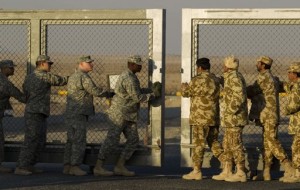Special to WorldTribune.com
By Fariborz Saremi, FreePressers.com
Iraq is facing a very uncertain future now that the Americans, worn down by the military (4,500 dead) and financial costs (over $1 trillion) have withdrawn their military forces.
The tide of sectarian conflict is rising, driven in part by Iranian ambition and Saudi Arabian fears. The Shi’ite majority sponsored by the Iranian government would seem to be making a concerted effort to dominate Iraq, while the Sunni minority, supported by Saudi Arabia, is becoming evermore resentful at the perceived persecution it suffers. Moreover the Kurds have grown stronger and see more realistic chances to form an independent state which has control over the vital Kirkuk oil fields.

Iran has cemented its influence by backing various proxy groups of special forces such as the “Kataeb Hizballah” or party of God; Asaib Al Haq or League of the Righteous. Some of these militias originated as factions of the now thought to be disbanded Mahdi Army militia led by the radical cleric Moqtada Al Sadr. There is a close relationship between these groups and Iran’s own security forces and this enables Iran to employ the militia to exert influence whenever it sees fit. This is especially true if the Sunni minority is seen to become too vocal or if the Iraqi government’s policies move too strongly against Iranian interests.
Within the Iranian forces the most important figure to emerge since the departure of American forces is Maj. Gen. Qassem Suleimani. He took command of the Al-Quds forces in 2000 and has turned it into a key instrument of Iranian security policy.
The Al-Quds force has been highly active in covert action within Iraq, Lebanon, Syria and the Gaza Strip. Although the widely feared Suleimani presents a shadowy figure he is a major player in shaping Iranian foreign and security policy. He was instrumental in setting up the Shi’ite “Special Groups” that once reactivated in the last few months have been behind the killing of the U.S. troops in the lead up to the American withdrawal. In fact the Americans describe him as a terrorist.
For the Arabs in general, the U.S. pullout from Iraq has simply delivered Iraq into Iranian hands.
In response Saudi Arabia and to some extent Turkey, has been funding Sunni insurgents. Since the U.S. withdrawal the Saudi government has become more active in supporting clandestine operations in retaliation to the Shi’ite dominance. It is not clear, however, how long the Saudis can sustain this secret support without outside help.
Emboldened by Iranian support, the Shi’ite government led by Prime Minister Nouri Al-Maliki has attempt to purge its strongest Sunni opponents. 600 high-ranking figures in Iraq’s minority Sunni community were recently arrested. Saudi Arabia is sure that this action was ordered by the clerics in Teheran and would seem to indicate Iran is willing to accept a certain degree of political turmoil, including terrorist activity against the Shiites, in return for overall political control.
This open campaign of the Iraqi government against its Sunni opponents may be a reaction to the spread of separatist ideas in the largely Sunni province of Salahuddin, where the exit of the Americans has left the population feeling vulnerable.
However, separatist discontent has also affected the Shi’ite South, where there is major resentment that the oil revenues mostly end up in Baghdad rather than staying in Basra. The reserves in the South represent two thirds of Iraq’s oil reserves of 143 billion barrels.
All of these tensions simply fuel the concern felt in Saudi Arabia and among the Arab monarchies that the Americans have abandoned Hosni Mubarak in Egypt and will do likewise in Iraq and Afghanistan, thus further destabilizing the area.
Dr. Fariborz Saremi is a commentator on TV and radio (German ARD/NDR TV,SAT 1,N24, Voice of America and Radio Israel) on Middle East issues and a contributer to FreePressers.com, WorldTribune.com and Defense&Foreign Affairs.

You must be logged in to post a comment Login